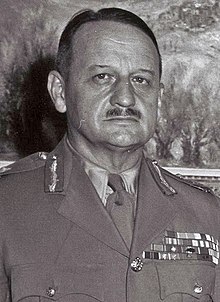Historical Obituary
Westmount, NS
June 17, 1897 - September 13, 1985
Lieutenant General Eedson Louis Millard Burns, known for his extraordinary service in the Canadian Army and his pioneering work in peacekeeping, was born on June 17, 1897, in Westmount, Nova Scotia. He passed away on September 13, 1985, at the age of 88, leaving behind a lasting legacy as one of Canada's most respected military leaders and diplomats. Burns' life was one of service—service to his country, his fellow soldiers, and the world, as he worked tirelessly to promote peace during a turbulent century.
Born to Louis Burns and Jean Burns (née Ross), Eedson was raised in Nova Scotia, where he showed an early aptitude for leadership and a strong sense of duty. His commitment to serve was evident when, at the young age of 17, he enlisted in the Canadian Militia during the First World War. Joining the Canadian Expeditionary Force, Burns served on the Western Front, where he was wounded during the Battle of the Somme in 1916. Despite his injuries, he returned to the front, displaying the courage and resilience that would come to define his military career. His experiences in the brutal battles of the First World War shaped his lifelong commitment to preventing future conflicts.
Following the war, Burns continued to pursue his military career. He attended the Royal Military College of Canada in Kingston, Ontario, where he graduated with distinction. Burns was also one of the few Canadian officers of his generation to undertake formal military education in Britain, studying at the Imperial Defence College. This advanced training not only equipped him with the strategic skills necessary for leadership but also forged connections with military counterparts worldwide, setting the stage for his future work in international peacekeeping.
Burns served with distinction in the interwar years, where his role in modernizing and professionalizing the Canadian Army was widely recognized. As tensions escalated in Europe in the late 1930s, Burns was promoted through the ranks, and when the Second World War broke out, he was ready to take on a leading role. During the war, he held key positions, including as commander of the 4th Canadian Armoured Brigade and later as the commander of the 5th Canadian Armoured Division. Known for his tactical acumen, Burns led his division through the Italian Campaign, taking part in significant battles, such as the Liri Valley offensive and the liberation of Northern Italy. Despite facing tough conditions and fierce German resistance, Burns' leadership contributed to several Allied victories. He was later promoted to command I Canadian Corps during the Italian Campaign and into Northwest Europe.
Burns' military career was not without its challenges. He was known as a highly intelligent and strategic leader, but his relationships with subordinates and superiors were sometimes strained. His demanding leadership style and reluctance to accept anything less than perfection occasionally put him at odds with fellow officers. Nevertheless, Burns' commitment to the mission and his unwavering dedication to the well-being of his soldiers earned him their respect and admiration. He was often found on the front lines, working alongside his troops, and was known for his meticulous attention to operational details, which saved countless lives during battle.
Following the conclusion of the Second World War, Burns transitioned from a military career to a diplomatic one, becoming a key figure in the nascent United Nations peacekeeping efforts. In 1954, he was appointed Chief of Staff of the United Nations Truce Supervision Organization (UNTSO) in Palestine, a role in which he was responsible for overseeing the delicate ceasefire arrangements between Israel and its neighboring Arab states. Burns’ work in the Middle East demonstrated his exceptional ability to navigate complex political landscapes and his commitment to promoting peace in a volatile region.
In 1956, Burns was appointed the Commander of the first United Nations Emergency Force (UNEF) during the Suez Crisis. This mission was the first of its kind—a multinational peacekeeping force established to separate the warring parties and facilitate a peaceful resolution. Burns played a pivotal role in organizing and leading this groundbreaking mission, earning him international recognition as one of the founders of modern peacekeeping. His work in establishing UNEF laid the foundation for future United Nations peacekeeping missions and cemented Canada's reputation as a global leader in promoting peace and stability.
Throughout his career, Burns received numerous accolades and honors. He was appointed a Companion of the Order of Canada in recognition of his outstanding service to the country, and he was also awarded the Distinguished Service Order (DSO) for his bravery and leadership during World War II. In addition to his military and diplomatic accomplishments, Burns was a prolific author, writing several books on military strategy and international relations, including "Between Arab and Israeli" and "General Mud: Memoirs of Two World Wars." His writings provided valuable insights into the complexities of warfare and peacekeeping, and they remain influential to this day.
Lieutenant General Eedson Louis Millard Burns' legacy is one of courage, dedication, and a lifelong commitment to the pursuit of peace. From the battlefields of Europe to the negotiating tables of the United Nations, Burns devoted his life to serving his country and the cause of international peace. He was a pioneer of peacekeeping, a respected military commander, and a proud Nova Scotian whose contributions to Canada and the world will not be forgotten.
Burns passed away in 1985, but his influence endures—in the principles of peacekeeping that continue to guide international relations and in the countless lives saved by his efforts to prevent and resolve conflict. His dedication to both his soldiers and the civilians affected by war serves as a powerful reminder of the importance of striving for peace even in the face of adversity.
Lieutenant General Burns is survived by his family, who remember him not only as a distinguished soldier and diplomat but also as a loving father and grandfather who carried his values of integrity and service into every aspect of his life.






Comments